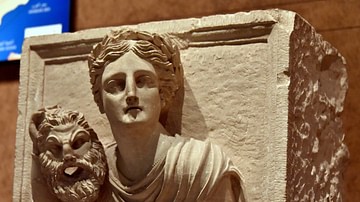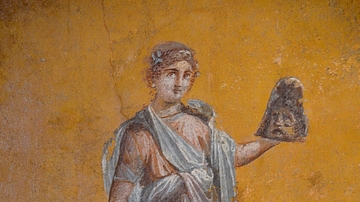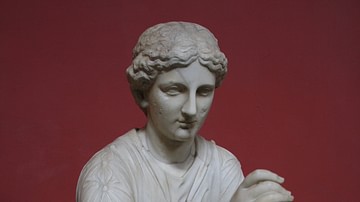Search
Summary 
Loading AI-generated summary based on World History Encyclopedia articles ...
Search Results

Image
Melpomene
A 1st century CE Roman sculpture of Melpomene, the Muse of tragedy. She holds a sword and the tragic mask of Hercules. (Vatican Museums, Rome).

Image
Melpomene from Raqmu-Petra
Melpomene, one of the nine Greek muses and patron of Greek tragedy, holding a mask of Pan or a satyr, instead of the tragic mask usually associated with her. This relief is one of a group of architectural sculptures that were discovered near...

Image
Fresco with Melpomene
A fresco fragment depicting Melpomene, the Muse of Tragedy, from the House of Julia Felix in Pompeii, 62-79 CE. (now in Louvre Museum, Paris)

Definition
Calliope
Calliope (also spelt Kalliope) is the Muse of epic poetry and heroic song in Greek mythology. She is considered the leader of the Muses and the most honoured of them all. She is often represented in art with a tablet on her knee and a stylus...

Article
A Visual Who's Who of Greek Mythology
Achilles The hero of the Trojan War, leader of the Myrmidons, slayer of Hector and Greece's greatest warrior, who sadly came unstuck when Paris sent a flying arrow guided by Apollo, which caught him in his only weak spot, his heel. Adonis...

Image
The Nine Muses of Greek Mythology
An infographic depicting the nine Muses of Greek mythology. The Muses are a group of divine sisters who govern various aspects of creativity and intellectual pursuits. Originally, the ancient Greeks recognized three Muses: Melete, Mneme...

Definition
Theogony
The Theogony is an 8th-century BCE didactic and instructional poem, credited to the Greek poet Hesiod. The Theogony was, at first, not actually written down, rather, it was part of a rich oral tradition which only achieved written form decades...

Definition
Muse
In Greek mythology, the nine Muses are goddesses of the various arts such as music, dance, and poetry. Blessed with wonderful artistic talents, they also possess great beauty, grace, and allure. Their gifts of song, dance, and joy helped...

Article
Hesiod on the Birth of the Gods
The Greek poet Hesiod (c. 700 BCE) is most famous for his works Theogony and Works and Days. In this passage from Theogony, Hesiod relates the birth of the gods from cosmic Chaos and follows the lineage through the great Zeus, King of the...

Video
Who are the Nine Muses of Greek Mythology?
The nine muses of Greek mythology are the goddesses of song, dance, music, and poetry and were among the most important deities of the ancient Greek pantheon as the source of inspiration for poets. The most common and widespread belief was...